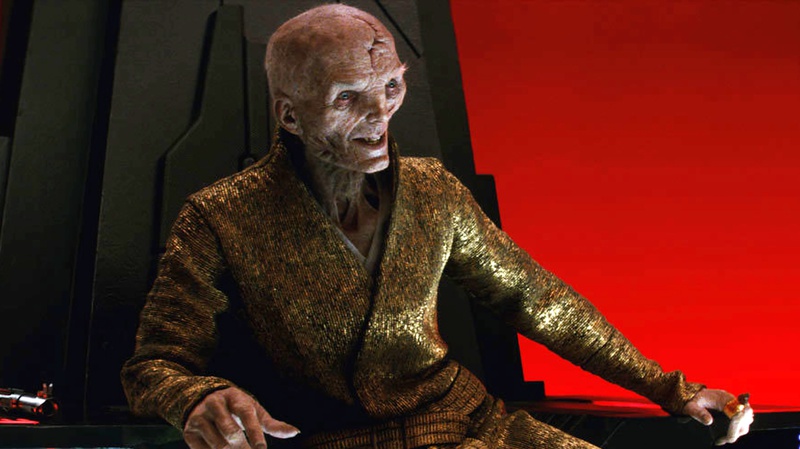
Even though the Skywalker Saga and Disney's Sequel Trilogy concluded in 2019 with The Rise of Skywalker, the debate over Rian Johnson's The Last Jedi and questions about its direction has continued amongst Star Wars fans.
USA Today bestselling author Sariah Wilson, a fellow Star Wars fan, is finally providing fans some answers thanks to her interview with Rian Johnson himself.
For instance, Wilson has already shared that Johnson was unaware that Ben Solo would die in The Rise of Skywalker and believes in the Reylo romance. But the author now has more answers to share, particularly in regard to the director's intentions for Supreme Leader Snoke.
SNOKE WAS NOT GOING TO GO THE WAY YOU THOUGHT

In a series of tweets, Wilson shared Rian Johnson's answers to her question of who "he thought Snoke was."
I asked Rian Johnson, given that there were no outlines or direction given to him, who he thought Snoke was. I shared with him my hope before TROS that he would turn out to be Darth Plagueis (especially since people returning from the dead in SW is a feature, not a bug).
— Sariah Wilson (@sariahwilson) March 24, 2021
Wilson's hope that Snoke was Darth Plagueis was a common theory amongst fans in the early years of Disney's Sequel Trilogy.
But Johnson's approach that "Snoke's identity was fundamentally uninteresting to him" shows how differently both the audience and a director can view a project.
He didn't want his answer to come across wrong, but to him the question of Snoke's identity was fundamentally uninteresting to him. What he was interested in was Kylo.
— Sariah Wilson (@sariahwilson) March 24, 2021
The purpose that Snoke served in the story was entirely in his relationship to Kylo. He said Snoke
So while some fans were fixated on Snoke's identity, the only identity Johnson attached to Snoke was that of a catalyst.
wasn't this fascinating character that we want to explore, and who is he, etc. For him, he was laser honed in on the characters on the table that he needed to push forward in this chapter which were Rey, Kylo, Finn and Poe. Those four - how did he move them to the next step
— Sariah Wilson (@sariahwilson) March 24, 2021
Johnson's intent to not repeat "exactly the original trilogy" in his handling Snoke and Kylo Ren is a possible response to the critique J.J. Abrams' The Force Awakens received upon its 2015 release.
Snoke was a bad father figure to Kylo, basically. He said it got to a point where he realized that instead of "repeating exactly the original trilogy," which if they drew it into the last movie with Snoke still being the Emperor figure and Kylo being like Vader, it's just going
— Sariah Wilson (@sariahwilson) March 24, 2021
Wilson's tweets come to a head here in revealing that Johnson's goal with Snoke and Kylo was to mix things up and take the plot in a different direction. As she explains, Johnson was focused on "what happens if Kylo ascends."
to lead to a natural and expected pattern. To him the much more interesting thing was, what happens if Kylo ascends. Where does that put him in the last movie where he's in a position of power. To him that was infinitely more interesting than anything regarding who Snoke might be
— Sariah Wilson (@sariahwilson) March 24, 2021
Johnson was clearly looking at Kylo Ren's story long-term. It's worth noting considering the Sequel Trilogy's disconnected storylines and that Johnson was never signed on to direct the third installment.
His focus for those scenes and Snoke was how they could best serve one of the main characters.
— Sariah Wilson (@sariahwilson) March 24, 2021
THE LAST WORD ON THE LAST JEDI
Much like the reception for The Last Jedi itself, the director's conversation with Sariah Wilson is likely to be received in different ways.
For critics of The Last Jedi, Johnson's lack of interest in Snoke could be seen as a lack of interest in Star Wars lore and pursuing the story he wanted as opposed to the one that best served the Skywalker Saga.
However, Johnson's decision to use Snoke to serve Kylo Ren's story and not detracting from a leading character's overall story could redeem the director's decision for some and validate it for others.
Regardless of how audiences viewed Johnson's work on The Last Jedi, it's only a positive hearing from the director himself and coming to understand his position from his perspective.












